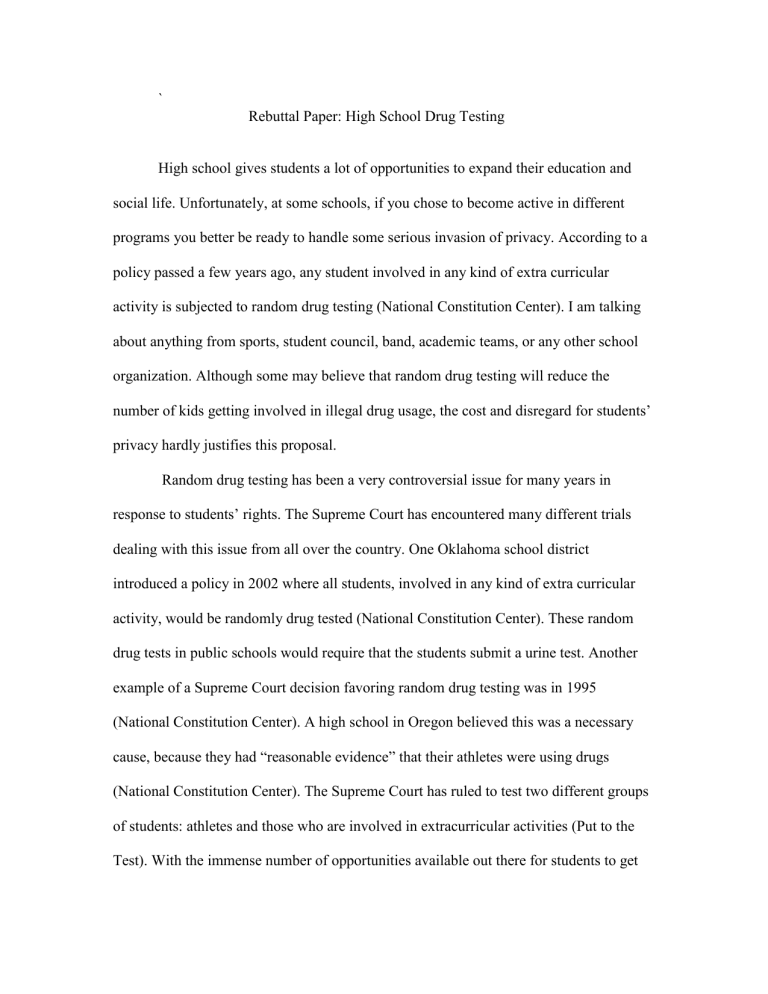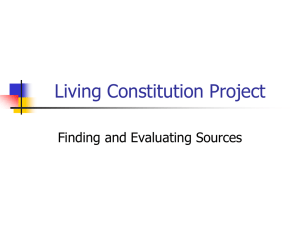High school is an opportunity for many students to get involved in

`
Rebuttal Paper: High School Drug Testing
High school gives students a lot of opportunities to expand their education and social life. Unfortunately, at some schools, if you chose to become active in different programs you better be ready to handle some serious invasion of privacy. According to a policy passed a few years ago, any student involved in any kind of extra curricular activity is subjected to random drug testing (National Constitution Center). I am talking about anything from sports, student council, band, academic teams, or any other school organization. Although some may believe that random drug testing will reduce the number of kids getting involved in illegal drug usage, the cost and disregard for students’ privacy hardly justifies this proposal.
Random drug testing has been a very controversial issue for many years in response to students’ rights. The Supreme Court has encountered many different trials dealing with this issue from all over the country. One Oklahoma school district introduced a policy in 2002 where all students, involved in any kind of extra curricular activity, would be randomly drug tested (National Constitution Center). These random drug tests in public schools would require that the students submit a urine test. Another example of a Supreme Court decision favoring random drug testing was in 1995
(National Constitution Center). A high school in Oregon believed this was a necessary cause, because they had “reasonable evidence” that their athletes were using drugs
(National Constitution Center). The Supreme Court has ruled to test two different groups of students: athletes and those who are involved in extracurricular activities (Put to the
Test). With the immense number of opportunities available out there for students to get
involved, these categories are beginning to include more and more people. By stating that random drug testing will be used for anyone involved in extracurricular activities, they are allowing themselves to test most of the student body.
Many schools believe that these random tests will discourage their students from abusing drugs. The school administrators also believe that it is their responsibility for their students’ health and safety (Put to the Test). Although many students probably appreciate their teachers’ concern for their well-being, isn’t it more the parents’ responsibility over any teacher or administrator. The school can act as a support for parents who are dealing with children facing problems with drugs, not a replacement for a parent (Put to the Test). Even though these random drug testing might discourage students from participating in different illegal drugs, they might also discourage students from getting involved at school. While making sure athletes are not taking steroids and participating in school sports is a good thought, there should be other ways to make sure this does not happen. For instance, if there were more education presented to athletes about the dangers of steroids and other illegal drugs, then perhaps fewer students would experiment. If the teachers and administration are so concerned with helping their students stay safe, let’s do more to educate them about the risks involved.
According to the Fourth Amendment, individuals have freedom from searchers unless there is a probable cause (Put to the Test). Although some people believe that if students have nothing to hide, then they should have no problem taking these tests; they don’t take into consideration the underlying fact that these random tests are a violation of privacy. Unless a school has overwhelming evidence that a student might be part-taking in certain drug use, there is no reason why they should test them. The school also
commented on the idea that this was less of an invasion of privacy for the athletes, because they already have to submit a physical and share public locker rooms (National
Constitution Center). This is a false analogy because even though someone works out at the gym and undresses there, it doesn’t give anyone the right to test them for drugs. Since these students have nothing to hide, they should have no problem being drug tested at any time. Also those supporting this theory believe that students, “give up their privacy when they receive physical exams and vaccinations at schools’ request” and drug testing should be the same way (Put to the Test). One example in which a school abused their privilege was in Alaska when a freshman student arrived at school tired with bloodshot eyes. The student’s teacher pointed him out, and gave him a visual test to see if drugs or alcohol were the cause of his red eyes. Even though this student was tired from staying up all night studying for a final exam, his vice principal demanded he either bring back a urine sample or be expelled for 90 days (Put to the Test). This is a prime example of how schools are getting out of control and abusing their privilege to randomly drug test students. How many times have you slept with your contacts in, or gotten a scratch on your eye that would result in them being red and irritated. School administrators need to get a handle on what exactly is reasonable evidence and make better decisions when it comes to testing students.
Another reason why drug testing should not be allowed in schools is due to the high costs. In 2004, President Bush proposed a 23 million dollar investment to a grant program that supports random drug testing for students (Curley). According to the Drug
Policy Alliance and the American Civil Liberties Union, the average cost for just an initial screening for just one student is forty-two dollars (Curley). If you take the number
of students at the school and all the follow up test that might need done, the numbers add up. It has been said that sometimes this number is so high that it takes away from the money set aside for existing drug prevention, counseling, and education courses (Curley).
The money used for these test could be put to better use, such as simply educating a student about the dangers and consequences involved in drugs and alcohol. There are only certain drugs that will appear from a urine test such as marijuana. Other drugs such as alcohol and tobacco do not show up but can be just as harmful. This could possibly lead to more underage drinking and risk taking behavior (Curley).
In accordance with the Drug Policy Alliance and the American Civil Liberties,
“drug testing is ineffective, undermines trust between adults and youth, and may discourage kids from taking part in extracurricular activities and sports” (Curley). The whole idea about testing students that are involved in school activities doesn’t seem to make very much sense. Are the people who are actively involved the ones who are going to be using illegal drugs? I believe that this is just an excuse for administrators to be able to test a larger amount of students. In reality, a person who is making the most out of their education and being active is probably one of the last people to get involved in drugs. It is also very unfortunate that many students then have mistrust with their elders, and feel they are only out there to get them in trouble. Drug testing is very ineffective and doesn’t benefit the student.
Randomly drug testing in school might scare some kids away from using certain drugs but the cost and the invasion of privacy just don’t seem to justify any of this.
Schools should be using their money more efficiently and invest in possible drug education programs that could be more beneficial in the long run. Although I appreciate
the schools concern for trying to steer their students away from this awful habit, I feel that more responsibility should be placed on the parents. I also understand that sometimes the parents are not their as a good influence for their children. This is where administrators can get involved by making sure the students are well educated. A well educated individual will be able to make smart decisions, without fear of being drug tested if they stay up late studying for an exam. Drug testing will continue to raise a lot of controversy over the years in response to students’ privacy. However, even though the schools intentions are good, there are better ways to go about helping an individual who might be struggling with drug addiction.
Works Cited
Curley, Bob. "Student Drug Testing: Compassion or Punishment?" Join Together
(2004). 19 Mar. 2006
<http://www.jointogether.org/news/headlines/features/2004/student-drugtesting-or.html>.
"National Constitution Center: Amendments:." National Constitution Center. 13
Mar. 2006 <http://www.constitutioncenter. org/explore/TheU.S.
Constitution/index.shtml #Amendments>.
"Put to the Test: Do School Drug Tests Violate Students' Rights?" (2003). 13
Mar. 2006
<http://www.findarticles.com/p/articles/mi_m0EPF/is_9_103/ai_1104016
07>.








